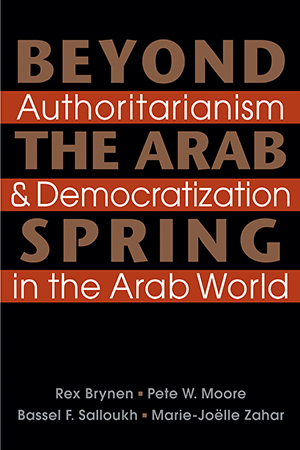Rex Brynen, Pete W. Moore, Bassel F. Salloukh, and Marie-Joëlle Zahar
For years the authoritarian regimes of the Arab world displayed remarkable persistence. Then, beginning in December 2010, much of the region underwent rapid and remarkable political change. This volume explores the precursors, nature, and trajectory of the dynamics unleashed by the Arab Spring.
The authors focus on the complex forces that have sustained authoritarianism in the region, as well as the roots of popular mobilization and regime overthrow. They also examine the possibilities for democratic reform—and relapse. Their work offers a comprehensive assessment, at once sophisticated and accessible, of current developments and trends in the countries of the Arab Middle East and North Africa.
Rex Brynen is professor of political science at McGill University. His numerous publications on the Middle East include A Very Political Economy: Peacebuilding and Foreign Aid in the West Bank and Gaza and, as coeditor, the two-volume Political Liberalization and Democratization in the Arab World. Pete W. Moore is associate professor of political science at Case Western Reserve University. He is author of Doing Business in the Middle East: Politics and Economic Crisis in Jordan and Kuwait. Bassel F. Salloukh is associate professor of political science and head of the politics and international relations program at the Doha Institute for Graduate Studies. He is coauthor of Mapping the Political Landscape: An Introduction to Political Science and coeditor of Persistent Permeability: Regionalism, Localism, and Globalization in the Middle East. Marie-Joëlle Zahar is associate professor of political science at the University of Montreal. She is coeditor of Intra-State Conflict, Government and Security: Dilemmas of Deterrence and Assurance.
No rights in South Asia"Provides a comprehensive explanatory framework with which to make sense of the Arab uprisings."—Jacob Høigilt, Journal of Islamic Studies
"A comprehensive assessment, at once sophisticated and accessible, of current developments and trends."—Elfatih A. Abdelsalam, The Muslim World Book Review
"An insightful and thought-provoking volume which addresses both the forces which have sustained authoritarianism in the region and the roots of popular mobilization."—Charis Bredin, Banipal
"Well documented in the recent literature about persistent authoritarianism and social movements for change, this undergraduate introduction may also serve as a useful reference for more advanced scholars and professionals."—Choice
"Well-researched and theoretically sound.... Scholars of contemporary Arab politics and policymakers will benefit from [this] book's rigorous and multidimensional approach to authoritarianism and democracy in the Arab world."—Library Journal
"Will the events of 2011 result in a softening of the authoritarianism that has long characterized the Arab world?... The authors of Beyond the Arab Spring offer a thoughtful, thorough, and timely foundation for thinking about that question."—Robert D. Lee, Colorado College
"The authors bring a sophisticated, multidimensional perspective to the analysis of Middle Eastern authoritarianism, most notably in their sensitivity to the complex international political economy that shapes the state at all levels.... Written with energy and clarity, the book will be valuable to scholars and students alike."—Mary Ann Tétreault, Trinity University






